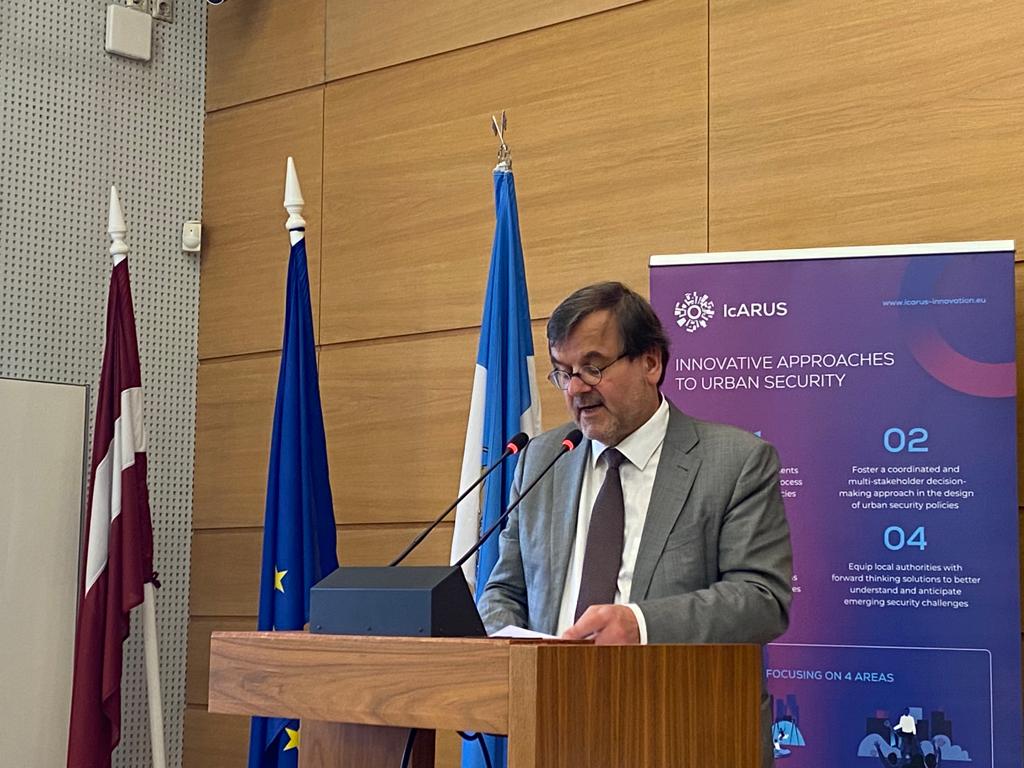Brussels, Belgium, November 2019 – Efus took part in the sixth “international conference on crime observation and analysis” organised on 4-6 November in Brussels by several partner organisations: the International Centre for the Prevention of Crime (ICPC, Montreal, Canada), the National Observatory on Crime and Criminal Justice Response (Observatoire national de la délinquance et des réponses pénales, ONDRP, French government), the National Institute of Higher Studies on Security and Justice (Institut national des hautes études de la sécurité et de la justice, INHESJ, French government), the National Observatory on Crime in Transport (Observatoire national de la délinquance dans les transports, ONDT, French Ministry of Transport), and Bruxelles Prévention & Sécurité (BPS, the agency in charge of crime prevention in the greater Brussels).
Some 150 people were in attendance: crime analysis specialists, public and private decision-makers, practitioners, law enforcement agency representatives, and NGOs from Australia, Belgium, Canada, France, India and Mexico.
> Gearing observatories towards more on-the-ground work and catering to local and regional authorities
As its title suggests, the conference’s overall theme was the observation and analysis of crime, in other words the role of observatories. The four plenary sessions were thus focused on 1) the development of international norms and standards for observatories on crime and crime analysis; 2) the role of observatories in evaluating programmes, projects and schemes; 3) the influence of observation on new strategies and measures to enhance security, and 4) feedback on international norms and standards for the development, functioning and evaluation of crime and security observatories.
One of the main conclusions of the event was that observatories should be closer to local and regional authorities in order to innovate, be more action-oriented, and provide real analytical data to political decision-makers not only at national level but also at regional and local level.
> Efus’ strategic approach to urban security
Representing Efus, Carla Napolano, Deputy Executive Director, spoke at the plenary session on the influence of observation on new security strategies and measures along with Adam Tomis, General Director of the Justice Department of Western Australia, and Jamil Araoud, General Director of Bruxelles Prévention & Sécurité (BPS). She stressed the benefits of Efus’ strategic approach to urban security, which is evidence-based and relies on multi-disciplinary partnerships gathering all relevant stakeholders.
> Innovative methods to mitigate feelings of insecurity: the Cutting Crime Impact (CCI) project
Efus also presented the Cutting Crime Impact (CCI) European project, in which it is a partner, which seeks to develop innovative methods to analyse and mitigate feelings of insecurity. Carla Napolano said that observation is a method that is widely used in social sciences and also increasingly in urban security studies.
It complements indirect methods that are often used to collect data on security and crime prevention, such as interviews through questionnaires, and can be used not only to collect data but also for analysis and decision-making. Observation can also be applied to technological innovation and citizen participation in security via social media, mobile apps and predictive software.
> Harmonising norms and standards for the monitoring and evaluation of observatories
Another highlight of the conference was the presentation of the work conducted since 2015 by the ICPC, the ONDRP and, more recently, the Organization of American States (OAS) to develop harmonised norms and standards for the monitoring and evaluation of crime observatories. This set of norms encompasses the management, funding and independence of observatories; data gathering and nomenclature; methods of analysis, and the production and dissemination of indicators.




